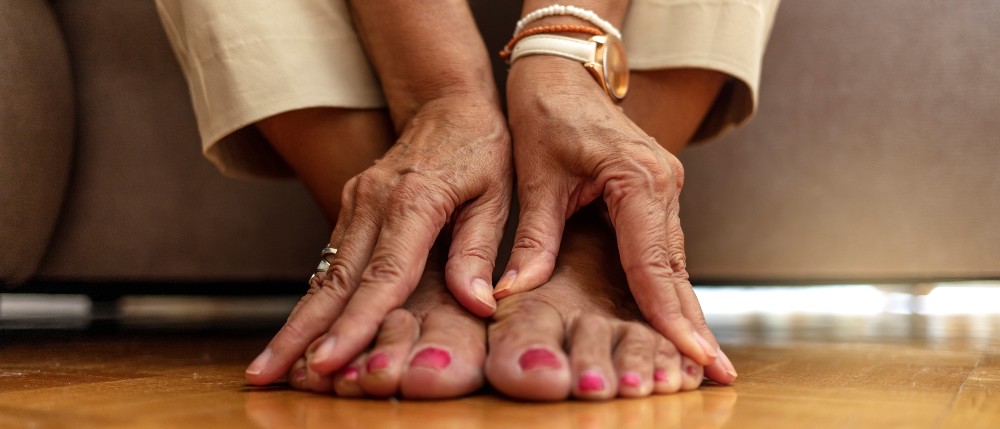According to the Centers for Disease Control and Prevention (CDC), 37.3 million Americans have diabetes. Prediabetes is a condition 96 million American adults suffer from. It’s a condition where blood sugar is high, but not yet high enough to be considered Type II diabetes.
If you’re one of these people, you need to read this article. Did you know feet are one of the highest-risk body parts with diabetes? Without proper diabetic foot care, even a tiny unnoticeable sore on the feet can be enough to cause a life-threatening infection and result in amputation which is often the only solution.
We’re going to show you how to protect your feet, so this doesn’t happen to you. Read on to learn how to care for your feet when you have diabetes.
Why Diabetic Foot Care is Important
Diabetes often damages nerves in the hands and feet. We call this type of nerve damage peripheral neuropathy. It can be very painful. But often, the opposite occurs. You lose your sensitivity to pain. Losing pain sounds nice until you realize it’s the body’s alarm system for when something is wrong. You can have a cut or sore and not know it’s there. While you’ll see a such sore on your hand, you won’t see a foot ulcer unless you’re looking for it.
So what’s the problem? You have a small sore and it will heal. That’s true for most people, but if you have diabetes, poor circulation makes it more difficult to heal. Blood flow and nerve problems often show up in your feet first, because they are farthest from your heart and brain and may not receive the nutrients needed for cell growth and regeneration. Even worse, poor circulation makes it harder for your body to fight off an infection. Proper wound care is critical.
When you can’t feel what’s happening in your feet, problems can quickly expand and become serious. Thus, proper diabetic foot care not only helps them stay healthy but can also provide clues to problems elsewhere in your body. If blood vessels in your feet are constricted, likely there is plaque buildup in other arteries as well, which puts you at risk for heart attack, stroke, or pulmonary embolism. If your feet tingle or feel numb, you could have damage to other nerves, too.
How to Care for Your Feet When You Have Diabetes
Now that you understand the danger diabetes poses for your feet, it’s time for some good news. A few simple tweaks to your daily routine are all that’s needed to avoid most diabetic complications for your feet. The American Diabetes Association advises that you practice these steps daily for diabetic foot care:
- Wash your feet thoroughly with lukewarm water.
- Examine your feet for sores, cuts, blisters, and corns.
- Apply general moisturizer to your feet but not between the toes.
Other foot care steps that we would add to that list to do daily are to:
- Notice any odd-shaped joints (bunions), toes (hammertoes), or nails (ingrown).
- Feel for lumps, swelling, calluses, unusual warmth or coldness, or areas of numbness.
- Check your nails for spots or discoloration, and the skin between your toes for rash or flaking.
- Sniff for any unusual odors that could indicate an infection.
- Check your socks and shoes for any pebbles or other objects that can irritate your feet.
The most important thing you can do for diabetic feet is to check them over every day. After you have carefully washed and dried them, sit down, lift one foot on your other knee, and examine it all over.
If you find signs of any of these problems, make an appointment so we can examine your feet and head off serious problems with quick treatment. The smallest of sores can develop into a serious foot ulcer that does not heal. Open wounds like this are always subject to infection, gangrene, and the possible need for amputation. Be vigilant, so it doesn’t happen to you.
Healthy Foot Habits for People With Diabetes
You can and should maintain basic habits that will do much to protect your feet. The most important is to control your blood sugar levels to prevent nerve and blood vessel damage. This means taking your medication and watching what you eat to avoid spikes.
Other important habits to keep your feet in the right shape include:
- Talk to our podiatrist about the best socks and footwear to protect your feet.
- Do not try home self-care for issues like corns or bunions.
- Exercise as it helps with circulation.
- Minimize walking whenever you have a sore on your feet.
- Seek our care right away if you have a wound or infection. We can’t stress enough the dangers of letting even a simple condition go untreated.
- If you can see and reach them easily, clean and trim your toenails properly to avoid ingrown nails and fungal infections.
- Roomy socks and shoes will reduce pressure and irritation and help avoid issues like foot deformities, calluses, corns, and swollen, red spots.
- Wear protection at all times, but especially on hot surfaces (pavement, beach sand) or in the cold.
Get Professional Diabetic Foot Care in Berkeley, CA
If you have a wound on your feet, it’s important that you see a professional as soon as possible. A podiatrist like Yuko Miyazaki can be a crucial part of your care team for managing your diabetes and providing great diabetic foot care. We provide care for diabetic wounds, medical nail trimming, and diet and exercise tips that fit your situation.
Call our office on Colby Street in Berkeley at (510) 647-3744 and schedule an appointment with us today. We’ll help you keep your feet in the best shape possible, so you can stay mobile and active despite your diabetes.

